| |||||
| Decades: | |||||
|---|---|---|---|---|---|
| See also: | |||||
Events in the year 2020 in the Principality of Andorra .
| |||||
| Decades: | |||||
|---|---|---|---|---|---|
| See also: | |||||
Events in the year 2020 in the Principality of Andorra .
Ongoing – COVID-19 pandemic in Andorra

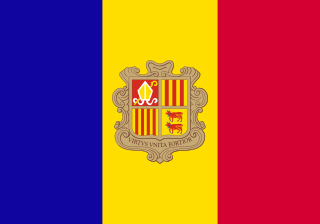
Andorra, officially the Principality of Andorra, is a sovereign landlocked country on the Iberian Peninsula, in the eastern Pyrenees, bordered by France to the north and Spain to the south. Believed to have been created by Charlemagne, Andorra was ruled by the count of Urgell until 988, when it was transferred to the Roman Catholic Diocese of Urgell. The present principality was formed by a charter in 1278. It is currently headed by two co-princes: the bishop of Urgell in Catalonia, Spain and the president of France. Its capital and largest city is Andorra la Vella.

La Seu d'Urgell is a town located in Alt Urgell county in Alt Pirineu, Catalonia, Spain. The town is also the head of its judicial district and the seat of the Bishop of Urgell, one of the co-princes of Andorra. It is located the most populated town of the region, with 17.4% of its population. La Seu d'Urgell and Puigcerdà together have 30% of the population of the area.

The Diocese of Urgell is a Latin Church diocese of the Catholic Church in Catalonia (Spain) and Andorra in the historical County of Urgell, with origins in the fifth century AD or possibly earlier. It is based in the region of the historical Catalan County of Urgell, though it has different borders. The seat and Cathedral of the bishop are situated in la Seu d'Urgell town. The state of Andorra is a part of this diocese.
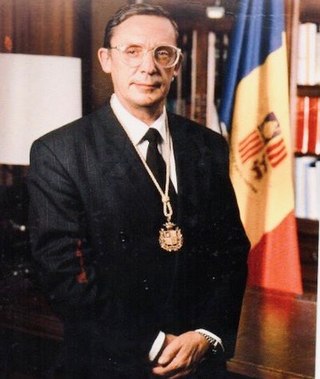
Òscar Ribas Reig was an Andorran politician, lawyer, and businessman who became the prime minister of Andorra in 1982. He twice served as head of government, first from 8 January 1982 to 21 May 1984 and again from 12 January 1990 to 7 December 1994.
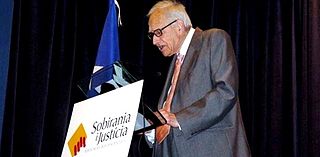
Antoni Maria Badia i Margarit was a Catalan linguist and philologist who produced works on the grammar and history of the Catalan language. He was born in Barcelona.

Antoni Martí Petit was an Andorran architect and politician who served as the prime minister of Andorra between 2011 and 2019, when he was elected on the ticket of the Democrats for Andorra.
The Premi d'Honor de les Lletres Catalanes is an award instituted by Omnium Cultural since 1969 to recognize a person by their scientific or literary work, written in Catalan language, the importance of their work and his/her significant contribution to cultural life of the Catalan Countries.

The National Archives of Andorra was established in 1975 under the direction of historian and civil servant Lídia Armengol i Vila.

Andorra competed at the 2016 Summer Olympics in Rio de Janeiro, Brazil, from 5 to 21 August 2016. This was the nation's eleventh consecutive appearance at the Summer Olympics.
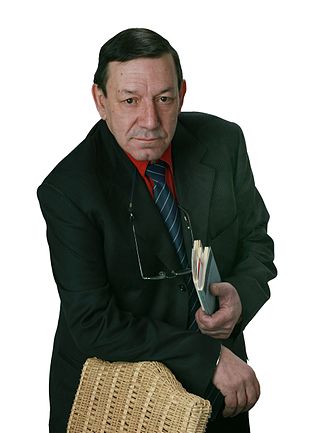
Antoni Morell Mora was a Spanish-born Andorran diplomat, civil servant, writer and lawyer.
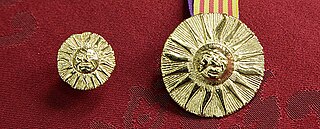
The Ramon Llull Award is an honor awarded annually by the Government of the Balearic Islands to persons or entities of the Balearic Islands that have excelled in any field. It was established in 1997 by Decree 3/2014.
Francesc Badia i Batalla was an Andorran public servant and historian. He served as the Episcopal Veguer of Andorra from 1972 until 1993. He also served as a judge of the Tribunal of the Courts of Andorra over the same time frame.
Joan Armengol i Pal was an Andorran attorney and politician; he also served as Mayor of Andorra la Vella between 1970 and 1971. During his term, he oversaw the population growth and the modernization of the city and was president of the local elections of 1971, the first in which women could vote.
Lídia Armengol i Vila was an Andorran historian and civil servant who championed the restoration of her country's historic language and culture.
Anarchism in Andorra peaked during the 1930s, when anarchist ideas were at the forefront of revolutionary politics in the Catalan countries.
Antoni Puigdellívol i Riberaygua was an Andorran businessman and politician.
Events in the year 2021 in Andorra.
Elidà Amigó i Montanya was an Andorran historian, archivist, activist, and suffragist. A leader in the feminist movement that led to Andorran women gaining the right to vote in 1970, she was also an academic expert on the history and sociology of the microstate of Andorra. She has been described as "the first Andorran intellectual to bring critical awareness to the condition of women" in the principality.
The literature of Andorra is part of Catalan literature, that is, of literature in the Catalan language. It is the literature represented by the writings created in the Principality of Andorra or by Andorran authors.
Badia or Badía is the surname of: